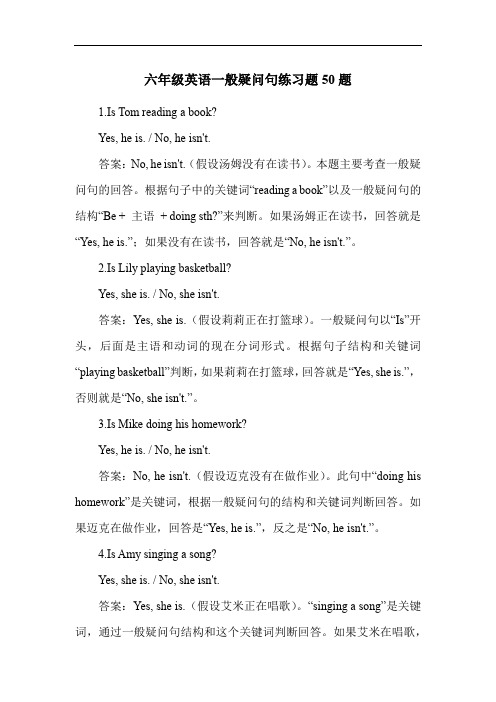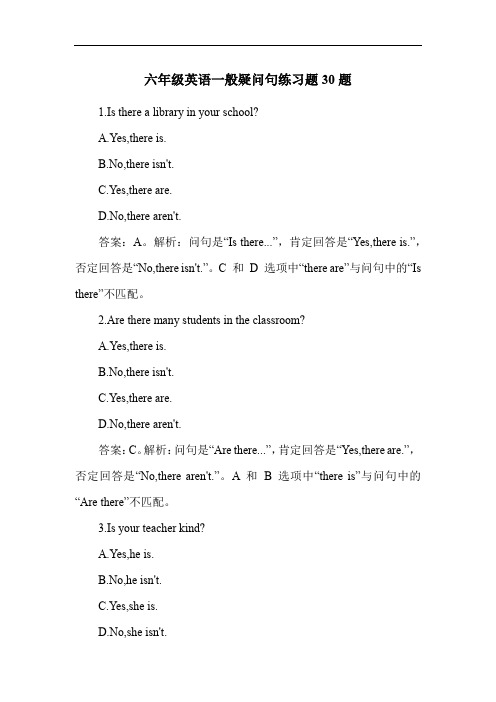六年级英语一般疑问句
六年级下册英语素材一般疑问句与特殊疑问句的区别 全国通用

英语语法中的一般疑问句和特殊疑问句的区别一、1.一般疑问句定义:能用yes / no回答的问句。
2. 含助动词be的一般疑问句的构成具体地说,就是当陈述句中有am /is / are时,可直接将它们提至主语前,但如遇第一人称,最好将其置换成第二人称。
如:I'm in Class 1, Grade 4. →Are you in Class 2, Gr ade 1? 你是在一年级二班吗?It's a map of Chi na. →Is it a map of China? 这是一幅中国地图吗?3. 含情态动词Can的一般疑问句的构成Can可直接将它们提至主语前。
如:I can do it. →Ca n you do it? 你会做吗?4. 含实义动词的一般疑问句的构成含实义动词的一般疑问句,要在句首加do;如果主语为第三人称单数,要在句首加does,并要将动词变回原形(如has→have,like s→like等);有时陈述句中的some还要变作any等。
如:She lives in Beijing. →Does she live in Beijing?她住在北京吗?I like English. →Do you l ike English? 你喜欢英语吗?二、一般疑问句的应答用yes / no回答如:①-Is Daming a Chinese boy? 大明是中国男孩吗?-Yes, he is. / No, he isn't. 是的,他是。
/不,他不是。
②-Can Daming speak Chinese? 莉莉会说中国话吗?-No, he can't. / Sorry, I don't know. 不,她不会。
/对不起,我不知道。
“师”之概念,大体是从先秦时期的“师长、师傅、先生”而来。
其中“师傅”更早则意指春秋时国君的老师。
《说文解字》中有注曰:“师教人以道者之称也”。
六年级英语一般疑问句练习题50题

六年级英语一般疑问句练习题50题1.Is Tom reading a book?Yes, he is. / No, he isn't.答案:No, he isn't.( 假设汤姆没有在读书)。
本题主要考查一般疑问句的回答。
根据句子中的关键词“reading a book”以及一般疑问句的结构“Be + 主语+ doing sth?”来判断。
如果汤姆正在读书,回答就是“Yes, he is.”;如果没有在读书,回答就是“No, he isn't.”。
2.Is Lily playing basketball?Yes, she is. / No, she isn't.答案:Yes, she is. 假设莉莉正在打篮球)。
一般疑问句以“Is”开头,后面是主语和动词的现在分词形式。
根据句子结构和关键词“playing basketball”判断,如果莉莉在打篮球,回答就是“Yes, she is.”,否则就是“No, she isn't.”。
3.Is Mike doing his homework?Yes, he is. / No, he isn't.答案:No, he isn't. 假设迈克没有在做作业)。
此句中“doing his homework”是关键词,根据一般疑问句的结构和关键词判断回答。
如果迈克在做作业,回答是“Yes, he is.”,反之是“No, he isn't.”。
4.Is Amy singing a song?Yes, she is. / No, she isn't.答案:Yes, she is. 假设艾米正在唱歌)。
“singing a song”是关键词,通过一般疑问句结构和这个关键词判断回答。
如果艾米在唱歌,回答为“Yes, she is.”,否则为“No, she isn't.”。
5.Is Sam watching TV?Yes, he is. / No, he isn't.答案:No, he isn't. 假设山姆没有在看电视)。
一般疑问句和特殊疑问句(讲义)通用版英语六年级下册

一般疑问句和特殊疑问句一般疑问句(1)概念:可以用Yes或者No来回答的疑问句是一般疑问句。
一般疑问句读的时候往往要用升调;译成汉语的时候常可以译为“......吗?”(2)结构:1、be动词+主语+其他肯定回答:Yes, ...am/ is /are.否定回答:No, ...am not./ isn’t / aren’t.例句1:Is this your English book?肯定回答: Yes,it is. / 否定回答: No,it isn't.例句2: Are these your English books?肯定回答: Yes,they are. / 否定回答: No,they aren't.2、情态动词+ 主语+ 动词原形+ 其它部分?肯定回答:Yes, ...can.否定回答:No, ...can’t.例句1:Can you speak English?肯定回答:Yes, I can. 否定回答:No, I can’t.例句2:Can he swim?肯定回答:Yes, he can. 否定回答:No, he can’t.3、助动词Do/Does+ 主语+动词原形+其他部分?肯定回答:Yes,...do/ does.否定回答:No, ...don’t/ doesn’t.例句1:Do you like flowers?肯定回答:Yes, I do. / 否定回答:No, I don’t.例句2:Does he like flowers?肯定回答:Yes, he does. / 否定回答:No, he doesn’t.(3)如何将陈述句变成一般疑问句?1、陈述句中有be动词(am, is , are等)或情态动词(can,must等)时,变成一般疑问句要将be动词和情态动词提到句首,句末加上问号即可,如果是第一人称,则要变成第二人称。
例如:She is a clever girl. → Is she a clever girl?I can swim. → Can you swim?2、句子里面含有实义动词(如like, likes, have,has, run, swim, jump等)。
六年级英语一般疑问句单选题30题

六年级英语一般疑问句单选题30题1.Is your mother a teacher?Yes, she is.No, she isn't.答案:根据实际情况回答。
本题考查含有be 动词的一般疑问句的回答。
如果妈妈是老师,回答Yes, she is.;如果不是,回答No, she isn't.。
2.Is there a library in your school?Yes, there is.No, there isn't.答案:根据实际情况回答。
本题考查there be 句型的一般疑问句的回答。
如果学校有图书馆,回答Yes, there is.;如果没有,回答No, there isn't.。
3.Is your classroom big?Yes, it is.No, it isn't.答案:根据实际情况回答。
本题考查含有be 动词的一般疑问句的回答。
如果教室大,回答Yes, it is.;如果不大,回答No, it isn't.。
4.Is your father a doctor?Yes, he is.No, he isn't.答案:根据实际情况回答。
本题考查含有be 动词的一般疑问句的回答。
如果爸爸是医生,回答Yes, he is.;如果不是,回答No, he isn't.。
5.Is your school beautiful?Yes, it is.No, it isn't.答案:根据实际情况回答。
本题考查含有be 动词的一般疑问句的回答。
如果学校美丽,回答Yes, it is.;如果不美丽,回答No, it isn't.。
6.Is your bedroom clean?Yes, it is.No, it isn't.答案:根据实际情况回答。
本题考查含有be 动词的一般疑问句的回答。
如果卧室干净,回答Yes, it is.;如果不干净,回答No, it isn't.。
六年级英语一般疑问句练习题30题

六年级英语一般疑问句练习题30题1.Is there a library in your school?A.Yes,there is.B.No,there isn't.C.Yes,there are.D.No,there aren't.答案:A。
解析:问句是“Is there...”,肯定回答是“Yes,there is.”,否定回答是“No,there isn't.”。
C 和D 选项中“there are”与问句中的“Is there”不匹配。
2.Are there many students in the classroom?A.Yes,there is.B.No,there isn't.C.Yes,there are.D.No,there aren't.答案:C。
解析:问句是“Are there...”,肯定回答是“Yes,there are.”,否定回答是“No,there aren't.”。
A 和 B 选项中“there is”与问句中的“Are there”不匹配。
3.Is your teacher kind?A.Yes,he is.B.No,he isn't.C.Yes,she is.D.No,she isn't.答案:根据实际情况回答,若老师是男性,答案为A;若老师是女性,答案为C。
解析:问句是“Is your teacher...”,老师是男性用“he”,肯定回答是“Yes,he is.”,否定回答是“No,he isn't.”;老师是女性用“she”,肯定回答是“Yes,she is.”,否定回答是“No,she isn't.”。
4.Are the desks new?A.Yes,they are.B.No,they aren't.C.Yes,it is.D.No,it isn't.答案:A。
小学英语沪教版六年级上册一般疑问句和特殊疑问句

小学英语沪教版六年级上册一般疑问句一、什么是一般疑问句用Yes或No作答的疑问句叫一般疑问句。
一般疑问句还有下列特点:1. 以be动词、助动词或情态动词开头;例:Is your father a teacher? Does Catherine like animals? Can Jenny speak French? 2. 往往读升调;3. 译成汉语,都可以带上“吗”,例如上面三句可分别译为:你父亲是老师吗?凯瑟琳喜欢动物吗?詹妮会说法语吗?二、如何将陈述句变成一般疑问句?要将陈述句变成一般疑问句,可以遵循下列步骤:1. 看句中有没有be动词(am、is、are、was、were)助动词(do、does、did、have、had)或情态动词(can、must、will、may等),如果有,将其提到句首,句末打上问号即可。
例:It was rainy yesterday.→Was it rainy yesterday?Tom's father can play the piano.→Can Tom's father play the piano?I have finished my homework.→Have you finished your homework?2. 如果句中没有be动词、助动词或情态动词,则根据谓语动词的形式借助do的相应形式放在句首。
具体方法是:如果谓语动词是原形,则借do;如果谓语动词是一般现在时第三人称单数形式,则借does;如果谓语动词是过去式,则借did. 需要注意的是,借does 或did后,原句的谓语动词要变回原形。
例:They go to school by bike.→Do they go to school by bike?Bill gets up at 6:30 every day.→Does bill gets up at 6:30 every day?The students saw a film yesterday.→Did the students see a film yesterday?三、陈述句变一般疑问句应注意的事项陈述句变成一般疑问句除了遵循上述规则以外,还应注意下列几点:1. 如果陈述句中有第一人称,则变问句时最好要变为第二人称。
六年级英语一般疑问句单选题30题

六年级英语一般疑问句单选题30题1. Do you like playing football after school?A. Yes, I do.B. No, I don't.C. Yes, I am.D. No, I'm not.答案:A。
一般疑问句以助动词Do 开头,回答也用do 或don't。
本题问“放学后你喜欢踢足球吗?”,喜欢用Yes, I do. 不喜欢用No, I don't. 选项C 和D 中的am 和are 与问题中的do 不匹配,所以选A。
2. Does she often read books in the library?A. Yes, she does.B. No, she doesn't.C. Yes, she is.D. No, she isn't.答案:A。
一般疑问句以助动词Does 开头,回答也用does 或doesn't。
本题问“她经常在图书馆读书吗?”,肯定回答Yes, she does. 否定回答No, she doesn't. 选项 C 和 D 中的is 与问题中的does 不匹配,所以选A。
3. Are you good at English?A. Yes, I am.B. No, I'm not.C. Yes, I do.D. No, I don't.答案:A。
一般疑问句以be 动词Are 开头,回答也用am/is/are。
本题问“你擅长英语吗?”,擅长用Yes, I am. 不擅长用No, I'm not. 选项C 和D 中的do 和don't 与问题中的are 不匹配,所以选A。
4. Do they have music class on Monday?A. Yes, they do.B. No, they don't.C. Yes, they are.D. No, they aren't.答案:A。
英语六年级一般疑问句

He can dance 变一般疑问句
Can he dance
情态动词:
情态动词放在句首其它不变 情态动词:canwill Eg:I will go to Beijing tomorrow. →will you go to Beijing tomorrow He can speak English . → Can he speak English
五.I like singing songs.
________________________________
作业:把下列陈述句改为一般疑问句 一.Mike can do the dishes.
二.I am reading a book.
三.She will buy a word book in the bookstore.
四.Sarah goes to Xinjiang by plane.
Are they cooking dinner
练习把下列句子改为一般疑问句
一、This is your pen. 二、We're watching TV. 三、There is a book on the desk. 四、It is a good dog. 五、I am from China. 六、Tom is an English boy.
练习:改为一般疑问句
He can swim.
I will go to Beijing tomorrow.
Tom can dance .
一般疑问句练习题陈述句变一般疑问句
一. His father is an English teacher. _______________________________ 二. These cats are crying.喊叫 _______________________________ 三. They can swim. _______________________________ 四. I like to read English. _______________________________ 五. I go to school on foot. _______________________________ 六. He likes playing football. _______________________________ 七. His father will go to the park by bus.
- 1、下载文档前请自行甄别文档内容的完整性,平台不提供额外的编辑、内容补充、找答案等附加服务。
- 2、"仅部分预览"的文档,不可在线预览部分如存在完整性等问题,可反馈申请退款(可完整预览的文档不适用该条件!)。
- 3、如文档侵犯您的权益,请联系客服反馈,我们会尽快为您处理(人工客服工作时间:9:00-18:30)。
They can go to Beijing by bus. Can they go to Beijing by bus? Yes, they can. / No, they can’t. I can do my homework. Can you do your homework? Yes, I can. No, I can’t. We can get there by bus. Can you get there by bus?
Uncle Wang reads newspaper every day. Does Uncle Wang read newspaper every day? Yes, he does. /No, he doesn’t. He does homework at 8:30. Does he do homework at 8:30? Yes ,he does. / No, he doesn’t/ They go to work by bus. Do they go to work by bus? Yes, they do. /No, they don’t. Tom likes reading . Does Tom like reading?
变一一般疑般问疑句问:句一的般方疑问法句:是指能用yes 和no 回答的问句,一 一般找疑问;找句句在子翻中译的有时没候有一系般动翻词译成am“, …is.,吗a?re”.如果句子 中Do有thaemy g,oist,oasrceh,o直ol b接y b将kea?m, is, are提前 二他看们骑:自看行句车子去中学有校吗没?有can,如果有can,直接将can 提到句子前面
三借:当句子中既没有系动词am, is, are. 也没有 情态动词can 时。要借助于助动词do 和does
一般疑问句的讲解 如何讲陈述句变成一般疑问句
1. 看句子中有没有系动词am ,is, are. 如果句子中有系动词 am, is, are ,把 他们直接提前到句子前面
1) She is going to the bookstore. (句子中有is) Is she going to the bookstore? Yes ,she is. / No, she isn’t.
She lives in China.
Does she live in China? Yes, she does. / No, she doesn’t.
My father watches TV in the evening. Does your father watch TV in the evening?
Yes, he does. / No, he doesn’t.
1.借助于do的情况 当主语是第一人称,第二人称以及第三人称复数I, you, we,they和复数作主语时/ 当主语后面的动词没有加s或者es的时候,要借助于do. I like collecting stamps. Do you like collecting stamps? Yes, I do. No ,I don’t. Two boys like riding a bike. Do two boys like riding a bike? Yes, they do. No, they don’t.
Yes ,it is. / No ,it isn’t Amy is going to buy a new CD. Is amy going to buy a new CD?
Yes, she is. / No, she isn’t.
They are watching TV. Are they watching TV?
Yes, we can. No, we can’t.
My mom is a singer. Is your mom a singer? Yes ,she is. / No, she isn’t. He can get to school by bike. Can he get to school by bike? Yes, he can. / No, he can’t. I want to be a science teacher. Do you want to be a science teacher? Yes, I do. / No, I don’t. It’s far from the bank. Is it far from the bank? Yes, it is. / No, it isn’t.
注意: 陈述句转化为一般疑问句的时候,第一人称I , we要转化为第二人称you, some要变成any.
I am going to buy some story books.
Are you going to buy any story books?
It’s near the school. Is it near the school?
(2)如果句子中有can,直接将can 提到句子前面,其他不变
She can get to the bookstore. Can she get to the bookstore? Yes , she can. / No, she can’t.
2 借助于does的情况 当主语是第三人称单数的时候,在变一般疑问句的时候, 我们要借助于助动词does.并且要把陈述句中动词的第三人 称单数形式还原为动词原形
变一般疑问句时,要把I ,w No, they aren’t.
I’m going to the zoo. Are you going to the zoo?
Yes, I am. / No, I’m not.
They look the same. Do they look the same? Yes, they do. / No, they don’t. Alice goes to school by bus. Does Alice go to school by bus? Yes, she does. / No, she doesn’t. He lives in the country. Does he live in the country? Yes, he does. /No, he doesn’t. He likes listening to music. Does he like listening to music? Yes, he does. / No, he doesn’t.
